Indian Creek Village – Torn Between Two Governing Systems
Indian Creek Village is a quiet Maya community situated along the Southern Highway in the Toledo District. The village has roughly one thousand five hundred villagers, comprising about two hundred households twelve miles out of Punta Gorda Town. But there is an unease in the village, brought on by different ideals. One is enforced by a Caribbean Court of Justice ruling in 2015 which stipulates that the traditional Maya system of governance remains in effect, and the other falls under the Village Council Act. Both systems have been around for centuries and while both have worked together seamlessly in the past, some residents of Indian Creek want to move away from the traditional way of life and towards the constitutional way that affords them to keep up with development. To move towards that goal, in November of last year, the villagers decided among themselves to vote out the alcalde, Jose Choc and his deputy, Felipe Sam, who they say were using the 2015 C.C.J. ruling to prohibit them from developing their village at the pace they want to go. They replaced Choc and Sam with Manuel Ack and Nicolas Choc, a decision that was approved by the Attorney-General’s Ministry. The Maya Leaders’ Alliance and the Toledo Alcalde’s Association, which adheres to the C.C.J. ruling, got an injunction in the High Court, however, and the villagers are now at a crossroads as to who are their village leaders. News Five’s Marion Ali was in Indian Creek for a meeting the village council called on Tuesday to discuss the matter with the residents. Here’s that report.
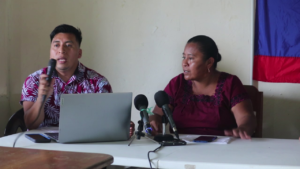
Augustine Sam
Augustine Sam, Resident, Indian Creek, Village
“Do you want the current alcalde to stay?” (Crowd cheer and clap)
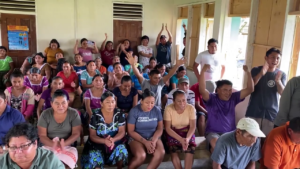 Marion Ali, Reporting
Marion Ali, Reporting
The fifty or so residents of Indian Creek Village who cheered on their current alcalde, Manuel Ack and deputy alcalde Nicolas Choc on Tuesday, did so in defiance of a motion brought forward by the Maya Leaders’ Alliance and the Toledo Alcalde’s Association to seek the court’s intervention to restrain Ack and Choc from carrying out alcalde duties. It comes in the face of a dual system of governance that has existed for centuries. The villagers, however, are torn between tradition and development.
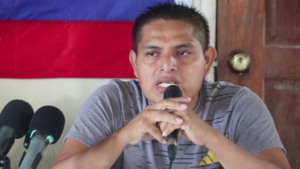
Anselmo Cholom
Anselmo Cholom, Member, Indian Creek Village Council
“What customary practice are we talking here? Are we talking in the 1200 BC when the ancient Mayas begin their civilization? Or are we talking when the Spaniards conquered the Maya people in the 17th, 17th and 19th, or 1502? So what tradition? I’m confused. So if we want to go back to tradition, are we going to build temples, Mayan civilization, like how we, like how we know about? Is that what we want now? Do we want our children to be slaves? We need to get an education. We need to get out of these things.”
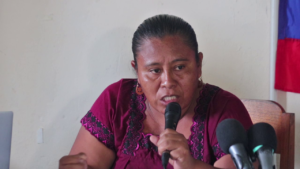
Avelina Coc
Avelina Coc, Chairlady, Indian Creek Maya Arts Women’s Group
“We remove the past Alcalde, Jose Choc, and Felipe Sam, because they have done many things. They rejected our digital power. They even signed a letter without the consent of the village council and the villagers of Indian Creek. They wrote a letter to the CEO. That same letter bounced back to the village council and there the problem arises. And then we voiced our concern that we need a change of the Alcalde because he is not doing development. He’s just rejecting what comes to the village and because we need development in our community.”
Avelina Coc was emphatic about her wish to have their November vote for Manuel Ack and Nicolas Choc remain as is. Several others from the village shared her sentiment.
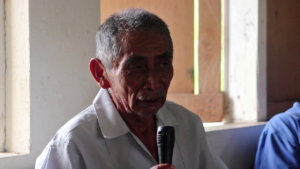
Miguel Ack
Miguel Ack, Elder, Indian Creek Village
“(Talking in Kek’chi Maya…translated) The past alcalde doesn’t agree with the chairman. How can they work together if they’re all divided?”
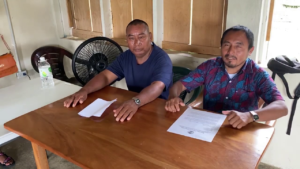 Avelina Coc
Avelina Coc
“Now with our present alcalde village councils are working together and then we see improvement streets being fixed. Things are happening in the village.”
The MLA and TAA want the previous alcalde leaders, Jose Choc and his deputy, Felipe Sam, to be reinstated. Senior Counsel Godfrey Smith told the media in June that they just want what the CCJ ruled upon to carry through.
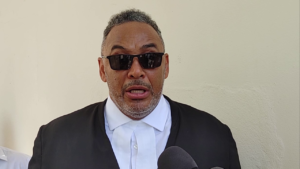
Godfrey Smith
Godfrey Smith, S.C., Attorney for T.A.A
“The government is saying, listen, you come here to court arguing about Alcaldes having customary rights. Practices and rights. No such thing exists in the laws of Belize. You won’t find anything about Alcalde’s customary practices in Village Councils Act and the Inferior Courts Act, and the state has the sovereign right to legislate, and it has, and this is the law of the land! And our response to that is, and will be developed, that in the same way that way back when the Maya first advocated for protection of customary land tenure, it wasn’t recognized in the laws of Belize, so too, we’re saying, that the right of their villages to exclusively determine who will be their alcaldes, and the right to remove them, vests in the village. Not by virtue of any. Written law of the land, but by a process of constitutional interpretation, utilizing international treaty obligations and international customary law.”
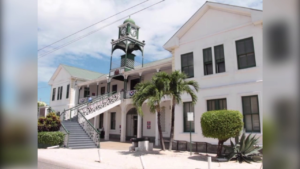 FILE: Jun 30, 2010
FILE: Jun 30, 2010
In 2007, the villages of Conejo and Santa Cruz in Toledo claimed their right of ownership over their communal lands in the Supreme Court of Belize. The Supreme Court agreed and decisively acknowledged that the two villages’ customary land rights are protected by international and Belizean law. In 2010, the Supreme Court of Belize extended the judgment to include the remaining thirty-six Maya communities in the Toledo District.
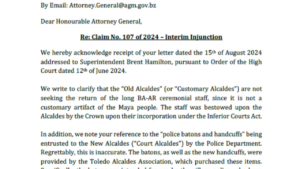 That same day, the Maya Leaders’ Alliance, led by Cristina Coc, celebrated the ruling in Indian Creek Village. Coc told the media then that the MLA supported progression, just in congruence with the Maya people’s standards. She said quote, we have never denied development, we have only asked for a development that is defined by our identity; a development that we define as a Maya people. Not a development that is imposed on us, not concepts and projects and programs that are imposed on us. We have seen many development projects come to Toledo and it has done more damage than good to our people so we are at a very important point where now we can define our development. Now the management of these lands are left in our hands and certainly we’re not moving backwards, we’re moving together with our country Belize, end quote.
That same day, the Maya Leaders’ Alliance, led by Cristina Coc, celebrated the ruling in Indian Creek Village. Coc told the media then that the MLA supported progression, just in congruence with the Maya people’s standards. She said quote, we have never denied development, we have only asked for a development that is defined by our identity; a development that we define as a Maya people. Not a development that is imposed on us, not concepts and projects and programs that are imposed on us. We have seen many development projects come to Toledo and it has done more damage than good to our people so we are at a very important point where now we can define our development. Now the management of these lands are left in our hands and certainly we’re not moving backwards, we’re moving together with our country Belize, end quote.
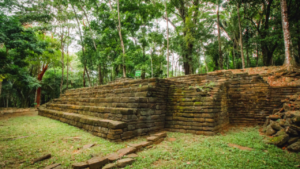 Situated not far from the Nim Li Punit Maya Temple, an archaeological monument that whispers the Maya tradition of past centuries, the way of life and the system of governance for Indian Creek residents rests on another court judgement. When that is determined, the people will be governed by what the collective wanted back in 2010, or what they say they now want for their children’s future. Village Council Member, Anselmo Cholom told News 5 that development does not mean departing from tradition, but they feel their previous alcaldes were imposing that.
Situated not far from the Nim Li Punit Maya Temple, an archaeological monument that whispers the Maya tradition of past centuries, the way of life and the system of governance for Indian Creek residents rests on another court judgement. When that is determined, the people will be governed by what the collective wanted back in 2010, or what they say they now want for their children’s future. Village Council Member, Anselmo Cholom told News 5 that development does not mean departing from tradition, but they feel their previous alcaldes were imposing that.
 Anselmo Cholom
Anselmo Cholom
“We’re not saying that we want to give up our tradition or move from the communal land system. But the people, the people that are leading the Mayan people is dividing us in a way where they did not respect the decision of the community. I practice traditions. That doesn’t mean that I cannot do it. Get development. That doesn’t mean that I cannot get a concrete building. And if we have to get out of a communal system because of that, then we have to change.”
While the number of people that showed up at Tuesday’s meeting represented only a fraction of the village, Cholom said that they speak on behalf of the majority of the residents who want development. Whether the villagers’ wishes will mean they have to return to the courts in the future to fight for an adjustment of the 2015 C.C.J. ruling to have their wish materialize remains something to see. Marion Ali for News Five.





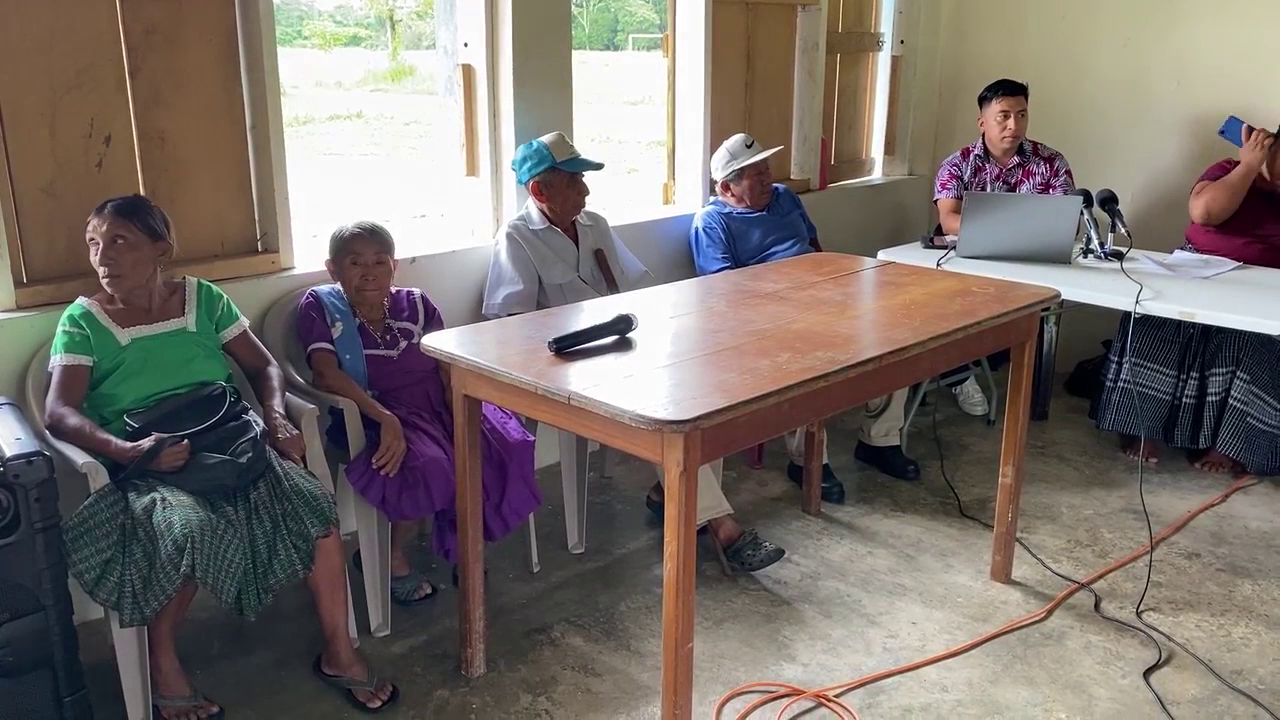

Facebook Comments